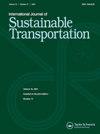减少个人旅行二氧化碳排放量的驱动因素:重复横截面分析
IF 3.9
3区 工程技术
Q2 ENVIRONMENTAL STUDIES
International Journal of Sustainable Transportation
Pub Date : 2024-08-02
DOI:10.1080/15568318.2024.2391886
引用次数: 0
摘要
本研究利用在韩国首尔进行的重复横截面家庭旅行调查,找出了 2006 年至 2016 年间城市地区个人旅行二氧化碳排放量变化的驱动因素。我们首先根据旅行行程记录估算了每位调查对象每年的日常旅行二氧化碳排放量,并估算了旅行方式的二氧化碳强度。结果表明,2006 年至 2016 年间,首尔个人出行的二氧化碳排放总量显著下降,这可能是由于车辆使用减少、向非机动车出行过渡、车辆技术改进以及交通状况改善等原因造成的。我们建立了两个多层次混合效应 Tobit 回归模型,以确定影响每年个人出行二氧化碳排放量的因素。结果表明,在 2006 年和 2016 年,一些群体(如男性、三四十岁、小家庭、高收入群体、有车一族)可能持续产生更多的个人出行二氧化碳排放量。两年之间估计系数的变化也进行了统计评估,表明一些人口群体(如老年人、大家庭)可能会减少个人出行的二氧化碳排放量。这些群体二氧化碳排放量的减少可能与首尔公共交通系统的持续投资有关。这些研究结果为清楚地了解与个人出行二氧化碳排放相关的出行行为变化提供了机会,并为可持续发展提供了启示。本文章由计算机程序翻译,如有差异,请以英文原文为准。
Factors driving reduction in CO2 emissions from personal travel: A repeated cross-sectional analysis
This study identifies factors that drive the changes in CO2 emissions from personal travel in urban areas during 2006 and 2016 using repeated cross-sectional household travel surveys conducted in Seoul, Korea. We first estimated the daily travel CO2 emissions of every survey participant for each year based on travel itinerary records and estimated CO2 intensity for the travel mode. The results suggest that total CO2 emissions from personal travel in Seoul declined remarkably between 2006 and 2016, potentially due to reduced vehicle use, transition to non-motorized travel, improved vehicle technology, and eased traffic conditions. Two multilevel mixed-effect Tobit regression models were developed to identify the factors affecting CO2 emissions from personal travel for each year. The results suggest that some cohorts (e.g. males, 30s and 40s, small households, high-income groups, car owners) are likely to produce more CO2 emissions from personal travel consistently in 2006 and 2016. The changes in the estimated coefficients between the two years were also evaluated statistically, suggesting that some population groups (e.g. elderly, large households) are likely to reduce CO2 emissions from personal travel. The reduction in CO2 emissions by these groups may be correlated with continued investment in the public transportation system in Seoul. These findings provide an opportunity to gain a clear understanding of travel behavioral changes related to CO2 emissions from personal travel, with insights toward sustainable development.
求助全文
通过发布文献求助,成功后即可免费获取论文全文。
去求助
来源期刊
CiteScore
8.90
自引率
2.60%
发文量
56
期刊介绍:
The International Journal of Sustainable Transportation provides a discussion forum for the exchange of new and innovative ideas on sustainable transportation research in the context of environmental, economical, social, and engineering aspects, as well as current and future interactions of transportation systems and other urban subsystems. The scope includes the examination of overall sustainability of any transportation system, including its infrastructure, vehicle, operation, and maintenance; the integration of social science disciplines, engineering, and information technology with transportation; the understanding of the comparative aspects of different transportation systems from a global perspective; qualitative and quantitative transportation studies; and case studies, surveys, and expository papers in an international or local context. Equal emphasis is placed on the problems of sustainable transportation that are associated with passenger and freight transportation modes in both industrialized and non-industrialized areas. All submitted manuscripts are subject to initial evaluation by the Editors and, if found suitable for further consideration, to peer review by independent, anonymous expert reviewers. All peer review is single-blind. Submissions are made online via ScholarOne Manuscripts.

 求助内容:
求助内容: 应助结果提醒方式:
应助结果提醒方式:


